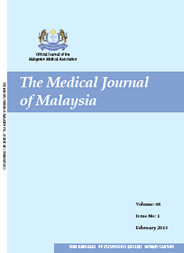MJM, Vol 70 Supplement 1 September 2015
Quality of life of caregivers of children with disabilities
in Sarawak
Faculty of Medicine and Health Sciences, University Malaysia Sarawak
ABSTRACT
Introduction: The dependency of the children with disabilities on the family due to their functional deficiency adds to the existing burden to the caregivers that could be detrimental to their own health and livelihood and would affect their ability to care for their children and affect their rehabilitation progress. This study aimed to assess the quality of life of the caregivers of children with disabilities in Sarawak, identify their unmet needs and evaluate the effectiveness of rehabilitation services in Sarawak.
Methods: Participants were chosen randomly among the caregivers of children with disabilities attending rehabilitation services in Community Based Rehabilitation (PDK), Government Clinic Based Rehabilitation (CliBR) and Non-Governmental Organisation (NGO) centres in six divisions in Sarawak. The participants were interviewed face to face using WHOQOL-BREF questionnaire.
Results: A total of 359 caregivers from 14 PDKs, 17 CliBRs and four NGO rehabilitation centres, participated in this study. This study revealed that the quality of life of caregivers of children with disabilities undergoing rehabilitation in Sarawak was good. Among the predicting factors of quality of life found in this study were: household income per month; followed by marital status; existence of medical illness; number of people taking care of child; presence of other family members with disability in the household; and gender of child. Other associated factors were: 1) Caregivers’ age, gender, ethnicity, occupation and education level; 2) Child’s age, position among siblings, type of disability; 3) Rehabilitation profiles: type of centre, total duration of rehabilitation and duration of rehabilitation at the centre.
Conclusion: The outcome of this study could be used to serve as a guide for future program development and refinement by tailoring to each caregivers and children’s individual needs, environment and preferences.
Keywords: quality of life, caregivers of children with disabilities, rehabilitation
